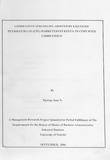| dc.description.abstract | Over the last 10 years, there have been many changes in the Kenyan economy. These
changes have had a considerable impact on all industries and the oil industry is no
exception having been liberalized in October, 1994. This research project was a census
survey to determine the competitive strategies that the LPG marketers who are ideally the
oil companies have adopted to respond to this change given that any investor can do
business if licensed and has the ability. The study explored characteristics of marketers /
factors that influence the competitiveness hence adoption of the various competitive
strategies. LPG is marketed in two different forms; bulk and bottled and is generally
homogeneous in nature. This study focused on bottled LPG which can only be
differentiated through cylinder size and colour, valves, regulator type and brand names. In
order to achieve these objectives, a questionnaire was dropped and picked or electronically
transmitted to all the companies who transact LPG business in Kenya. In this study, LPG
stands for Liquefied Petroleum Gas.
The study established that the industry had encountered challenges such as; illegal filling
into competitor cylinders by unscrupulous businessmen, competition from wood energy
and kerosene whose prices are lower than those of LPG, high costs of cylinders, uncertainty
of product availability and low prices posted by other competitors. Different marketers
responded differently to these challenges through such strategies as keeping low overhead
costs so as to maintain competitive prices, ensuring product availability, use of exclusive
distribution channels, investment in human resource development to ensure good customer
care and extension of credit to ratable customers. The study also established that currently,
majority of the marketers were multinational companies. Seven respondents were targeted
but only six responded.
The study established that the Government has stepped in to standardize the valves. This is
meant to encourage more competition by making the product more available and
affordable. However, _th.e..• initial capital outlay still looks way beyond what most investors
can afford to start the business.
Vll
Further research on the industry can be undertaken by establishing competitive strategies
that LPG marketers will undertake after the standardization of the valves given that
currently, it is used as a source of differentiation.
Vlll | en |

